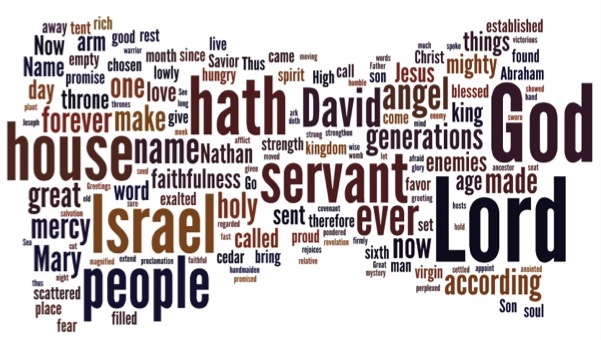4 Advent
2 Sam. 7:1-11, 16 • Cant. 3 or Cant. 15 or Ps. 89:1-4, 19-26 • Rom. 16:25-27 • Luke 1:26-38
The king reclines in his cedar castle, reflecting on the distribution of resources in relation to status and influence. “See now, I am living in a house of cedar, but the ark of God stays in a tent” (2 Sam. 7:2). This, the king considers, ought not to be so. Let the Lord live like me, better than me, in a house of glory, of stone, brick, and gold. The king’s wish is granted by the prophet, and then rescinded after the Lord speaks. “Unless the Lord builds the house, those who build it labor in vain” (Ps. 127:1).
The Lord confesses an affinity to the open air and a lightweight pack for the Divine: “I have been moving about in a tent and a tabernacle” (2 Sam. 7:6). The time comes, of course, when “the Lord will make you a house” (2 Sam. 7:11), and the time has come when the Lord permits to his glory the construction of basilicas and cathedrals and parish churches. Still, God is not mocked, nor should we be fooled. There are no sacred places and there is no holy land that locks, contains, or otherwise constrains the divine presence.
Jesus walks along the Sea of Galilee. So, in union with him, we walk. John Wycliffe, in his early Bible translation and in many of his sermons, rendered the Latin ambulare as wander. “Jhesu seith to him, ryse vp taak thi bed and wander, and a non the man is maad hool, and took vp his bed and wandride” (John 5:8; 1380 trans., OED). “The Lord will keep your going out and coming in from this time on and forevermore” (Ps. 121:8). We move and the Lord moves with us. This we know and confess in the consummate mystery of the angel’s visit to Mary: “Greetings, favored one! The Lord is with you” (Luke 1:28). The Lord is, of course, with her in a special sense: “you will conceive in your womb and bear a son, and you will name him Jesus” (Luke 1:31). Mary’s story recapitulates Old Testament types and establishes a model for all future Christians. We are Christ-bearers. So it is fitting that Mary’s story can be anyone’s story, in some measure. And a story I have.
While the future mother of Thomas Aquinas was minding her own business, an angel appeared to her and said, “Rejoice, Domina, because you are with child, and you will bear a son whom you will call Thomas.” The pregnancy and birth were miraculous and immediate. One day, while Thomas’s mother, Theodora, was in Napoli at the public bath with other women, Thomas being carried by his nurse, the nurse noticed a piece of paper in the boy’s hand. “The boy, by divine providence, found a small piece of paper and grabbed it. … When the nurse tried to open his hand, he screamed. So she bathed and scrubbed and clothed the boy, and carried him to his mother while he held his hand tightly closed. When his mother opened his fist, he cried out. There she found a little scrap of paper containing nothing other than the Ave Maria. … No one could quiet his tears until he was holding the paper, which, as soon as he had it again, he put in his mouth [indicating] deep rumination and that he would, in time, know the taste of sweetness (scriptural interpretation)” (Hystoria beati Thomae de Aquino by Guglielmo di Tocco).
“The word is very near you, on your lips and in your heart” (Rom. 10:8).
Look It Up
Read Luke 1:38.
Think About It
“Think of the Lord as being in the very inmost part of the Soul” (Teresa of Ávila).
TLC on Facebook ¶ TLC on Twitter ¶ TLC’s feed ¶ TLC’s weblog, Covenant ¶ Subscribe










